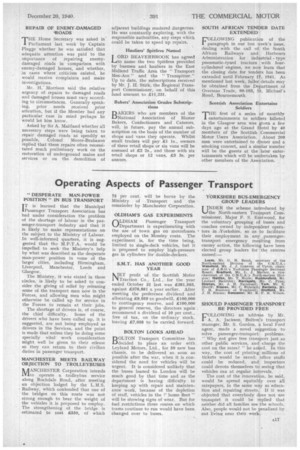Operating Aspects of Passenger , Transport
Page 19

If you've noticed an error in this article please click here to report it so we can fix it.
"DESPERATE MAN-POWER POSITION" IN BUS TRANSPORT
I T is learned that the Municipal Passenger Transport Association has had under consideration the problem of the shortage of labour in the passenger-transport industry and that it is likely to make representations on the subject to the Ministry of Labour. In well-informed quarters, it is suggested that thy M.P.T.A. would be impelled to seek the Ministry's help by what was described as the desperate man-power position in some of the larger cities, including Birmingham, Liverpool, Manchester, Leeds and Glasgow.
The Ministry, it was stated in these circles, is likely to be asked to consider the giving of relief by releasing some of the transport men now in the Forces, and allowing men who might otherwise be called up for service in the Forces to remain at their jobs.
The shortage of drivers is, of course, the chief difficulty. Some of the drivers who have been called up, it is suggested, are not being employed as drivers in the Services, and the point is made that unless they be doing some specially vital work consideration might well be given to their release so they can return to their civilian duties in passenger transport.
MANCHESTER MEETS RAILWAY OBJECTION TO TROLLEYBUSES
AANCHESTER Corporation intends 1V/to operate a trolleybus service along Rochdale Road, after meeting an objection lodged by the L.M.S. Railway, which contended that one of the bridges on this route was not strong enough to bear the weight of the vehicles it is proposed to employ. The strengthening of the bridge is estimated to cost £550, of which 75 per cent, will be borne by the Ministry of Transport and the remainder by Manchester Corporation.
OLDHAM'S GAS EXPERIMENTS
QLDHAM Passenger Transport Department is experimenting with the use of town gas on motorbuses • employed on the Mossley route. The experiment is, for the time being, limited to single-deck vehicles, but it is proposed to employ high-pressure gas in cylinders for double-deckers.
S.M.T. HAS ANOTHER GOOD
mET profit of theScottish Motor
Traction Co., Ltd., for the year ended October 31 last was £381,593, against £378,881 a year earlier. After meeting the preference dividend and allocating £9,959 to goodwill, £100,000 to contingency reserve, and £100,000 to general reserve, the directors again _ recommend a dividend of 10 per cent., free of tax, on the ordinary stock, leaving £7,058 to be carried forward.
BOLTON LOOKS AHEAD
BOLTON Transport Committee has L./decided to place an order with Leyland Motors, Ltd., for 50 new bus chassis, to be delivered so soon as possible after the war, when it is considered the need for vehicles will be urgent. It is considered unlikely that the buses loaned to London will be much good by that time and as the department is having difficulty in keeping up with repair and maintenance work, because of the depletion of staff, vehicles in the =' home fleet " will be showing signs of wear. But for fuel restrictions three routes on which trams continue to run would have been changed over to buses.
YORKSHIRE BUS-EMERGENCY GROUP LEADERS
UNDER the scheme introduced by Ithe North-eastern Transport Commissioner, Major F. S. Eastwood, for the voluntary grouping of buses and 'coaches owned by independent operators in -Yorkshire, so as to facilitate their employment in any passengertransport emergency resulting from enemy action, the following have been elected group leaders for the centres named:—
SHOULD PASSENGER TRANSPORT BE PROVIDED FREE
FOLLOWING an address by Mr. A. A, Jackson, Bolton's transport manager, Mr. S. Gordon, a local Ford agent, made a novel suggestion to solve passenger-transport problems.
Why not give free transport just as other public services, and charge the cost on the rates? " he asked. In this way, the cost of printing millions of tickets would be saved; office stalls could be reduced, and inspectors could devote themselves to seeing that vehicles ran at regular intervals.
The cost of the innovation, he said, would be spread equitably over all ratepayers, in the same way as education and repairing streets. If it was objected that everybody does not use transport it could be replied that neither did all families use the schools, Also, people would not be penalized by not living near their work.




















































